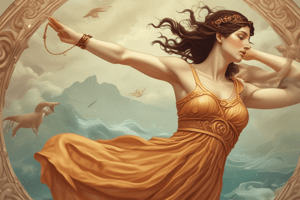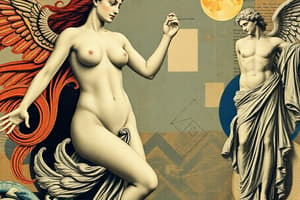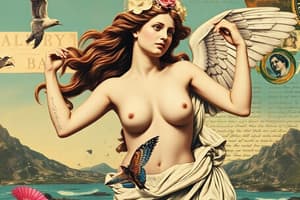Podcast
Questions and Answers
What is Apollo known as the god of?
What is Apollo known as the god of?
- Harvest and agriculture
- The sun, music, poetry, prophecy, and healing (correct)
- War and peace
- The sea and earthquakes
Which symbol is associated with Hera?
Which symbol is associated with Hera?
- Peacock (correct)
- Trident
- Lyre
- Thunderbolt
Who is the father of Zeus?
Who is the father of Zeus?
- Cronus (correct)
- Uranus
- Poseidon
- Hades
What is Hestia the goddess of?
What is Hestia the goddess of?
Which of the following offspring is NOT a child of Zeus?
Which of the following offspring is NOT a child of Zeus?
What role did Hera play in the Trojan War?
What role did Hera play in the Trojan War?
What does Poseidon symbolize?
What does Poseidon symbolize?
Which god helped defeat the Python?
Which god helped defeat the Python?
What is the symbol associated with Aphrodite?
What is the symbol associated with Aphrodite?
Who is the Roman counterpart of Hades?
Who is the Roman counterpart of Hades?
Which deity is recognized as the god of craftsmanship?
Which deity is recognized as the god of craftsmanship?
What is the connection between Artemis and Apollo?
What is the connection between Artemis and Apollo?
Which goddess is known as the virgin goddess without offspring?
Which goddess is known as the virgin goddess without offspring?
Who was married to Aphrodite?
Who was married to Aphrodite?
What event did Aphrodite play a significant role in?
What event did Aphrodite play a significant role in?
What led to the seasonal cycle associated with Persephone?
What led to the seasonal cycle associated with Persephone?
Flashcards
Aphrodite's role
Aphrodite's role
Goddess of love, beauty, and desire
Hades' domain
Hades' domain
God of the Underworld and the dead
Hephaestus' skills
Hephaestus' skills
God of fire, blacksmiths, and craftsmanship
Athena's domain
Athena's domain
Signup and view all the flashcards
Artemis' role
Artemis' role
Signup and view all the flashcards
Apollo's responsibilities
Apollo's responsibilities
Signup and view all the flashcards
Zeus's title
Zeus's title
Signup and view all the flashcards
Hera's role
Hera's role
Signup and view all the flashcards
Hestia's focus
Hestia's focus
Signup and view all the flashcards
Poseidon's domain
Poseidon's domain
Signup and view all the flashcards
Aphrodite's Roman equivalent
Aphrodite's Roman equivalent
Signup and view all the flashcards
Hades' Roman equivalent
Hades' Roman equivalent
Signup and view all the flashcards
Hephaestus' Roman equivalent
Hephaestus' Roman equivalent
Signup and view all the flashcards
Athena's Roman equivalent
Athena's Roman equivalent
Signup and view all the flashcards
Artemis' Roman equivalent
Artemis' Roman equivalent
Signup and view all the flashcards
Apollo's Roman equivalent
Apollo's Roman equivalent
Signup and view all the flashcards
Study Notes
Aphrodite
- Goddess of love, beauty, and desire, symbolized by doves, swans, roses, and the scallop shell.
- Often involved in love stories with both gods and mortals, emphasizing themes of romance and seduction.
- Roman counterpart is Venus.
- Her origins vary; born from sea foam or as the daughter of Uranus (in some myths) or Zeus and Dione in others.
- Mother to Eros (with Ares), Harmonia, Phobos, and Deimos.
- Married to Hephaestus but had numerous affairs, particularly with Ares.
- Played a pivotal role in the Trojan War by influencing Paris's judgment that led to Helen's abduction.
Hades
- God of the Underworld and the dead, associated with symbols such as Cerberus, the Helm of Darkness, and the cypress tree.
- Brother of Zeus and Poseidon; known as the ruler of the dead.
- Roman counterpart is Pluto.
- Son of Cronus and Rhea, with no direct offspring but linked to the Erinyes (Furies).
- Abducted Persephone to reign as his queen, creating the seasonal cycle tied to her mother's grief.
Hephaestus
- God of fire, blacksmiths, metalworking, and craftsmanship, represented by a hammer, anvil, and tongs.
- Husband of Aphrodite, typically portrayed as the "crippled" god.
- Roman counterpart is Vulcan.
- Offspring include Thalia, the Kabeiroi, and Erichthonius.
- Thrown from Mount Olympus due to his deformity, either by Hera or Zeus.
- Renowned for crafting magical items like Zeus' thunderbolt, Achilles' armor, and Pandora's box.
Athena
- Goddess of wisdom, war strategy, and crafts, symbolized by an owl, olive tree, and aegis (shield).
- Sprang fully armed from Zeus's head.
- Roman counterpart is Minerva.
- Daughter of Zeus and Metis, who was swallowed by him, resulting in Athena's birth.
- Remains a virgin goddess without offspring.
- Aided heroes like Odysseus and Perseus, and played a crucial role in founding Athens by offering the olive tree.
Artemis
- Goddess of the hunt, wilderness, and the moon, depicted with a bow and arrow, deer, and moon.
- Twin sister of Apollo.
- Roman counterpart is Diana.
- Daughter of Zeus and Leto, also a virgin goddess with no children.
- Known for fiercely protecting her virginity and enacting revenge on those who violated it, as seen in the story of Actaeon.
- Assisted in the birth of her brother Apollo.
Apollo
- God of the sun, music, poetry, prophecy, and healing, identified by the lyre, laurel wreath, and sun symbol.
- Twin brother of Artemis.
- Roman counterpart shares the same name.
- Son of Zeus and Leto, fathering Asclepius (with Coronis), Orpheus, and Troilus.
- Maintained a connection to the Oracle of Delphi, offering prophetic insights.
- Central figure in mythological narratives, including the defeat of the Python.
Zeus
- King of the gods, associated with the sky, thunder, and lightning, represented by the thunderbolt, eagle, and oak tree.
- Ruler of Mount Olympus, brother to Poseidon and Hades, and husband to Hera.
- Roman counterpart is Jupiter.
- Son of Cronus and Rhea, father to many deities including Athena, Apollo, Artemis, Hermes, Dionysus, Heracles, and Perseus.
- Overthrew his father Cronus, establishing the Olympian pantheon.
- Known for numerous affairs with both goddesses and mortals, leading to various divine offspring.
Hera
- Goddess of marriage and childbirth, revered as the Queen of the gods, symbolized by the peacock, cow, and pomegranate.
- Sister and wife to Zeus.
- Roman counterpart is Juno.
- Daughter of Cronus and Rhea; mother of Ares, Hephaestus, Hebe, and Eileithyia.
- Noted for her jealousy and vengefulness towards Zeus’ lovers and their children, such as Heracles and Leto.
- Actively supported the Greeks during the Trojan War.
Hestia
- Goddess of the hearth, home, and family, symbolized by the hearth and flame.
- The oldest sister of Zeus, representing peace and domesticity.
- Roman counterpart is Vesta.
- Daughter of Cronus and Rhea; she’s a virgin goddess with no children.
- First and last deity swallowed and regurgitated by Cronus.
- Voluntarily gave up her seat on Olympus to Dionysus to maintain harmony.
Poseidon
- God of the sea, earthquakes, and horses, known for his trident, horse, and dolphin symbols.
- Brother of Zeus and Hades.
- Roman counterpart is Neptune.
- Son of Cronus and Rhea, with many offspring including Theseus, Polyphemus (the Cyclops), Triton, and Pegasus (with Medusa).
- Contested Athena for the patronage of Athens but lost, highlighting his significant role in mythological conflicts.
Studying That Suits You
Use AI to generate personalized quizzes and flashcards to suit your learning preferences.




